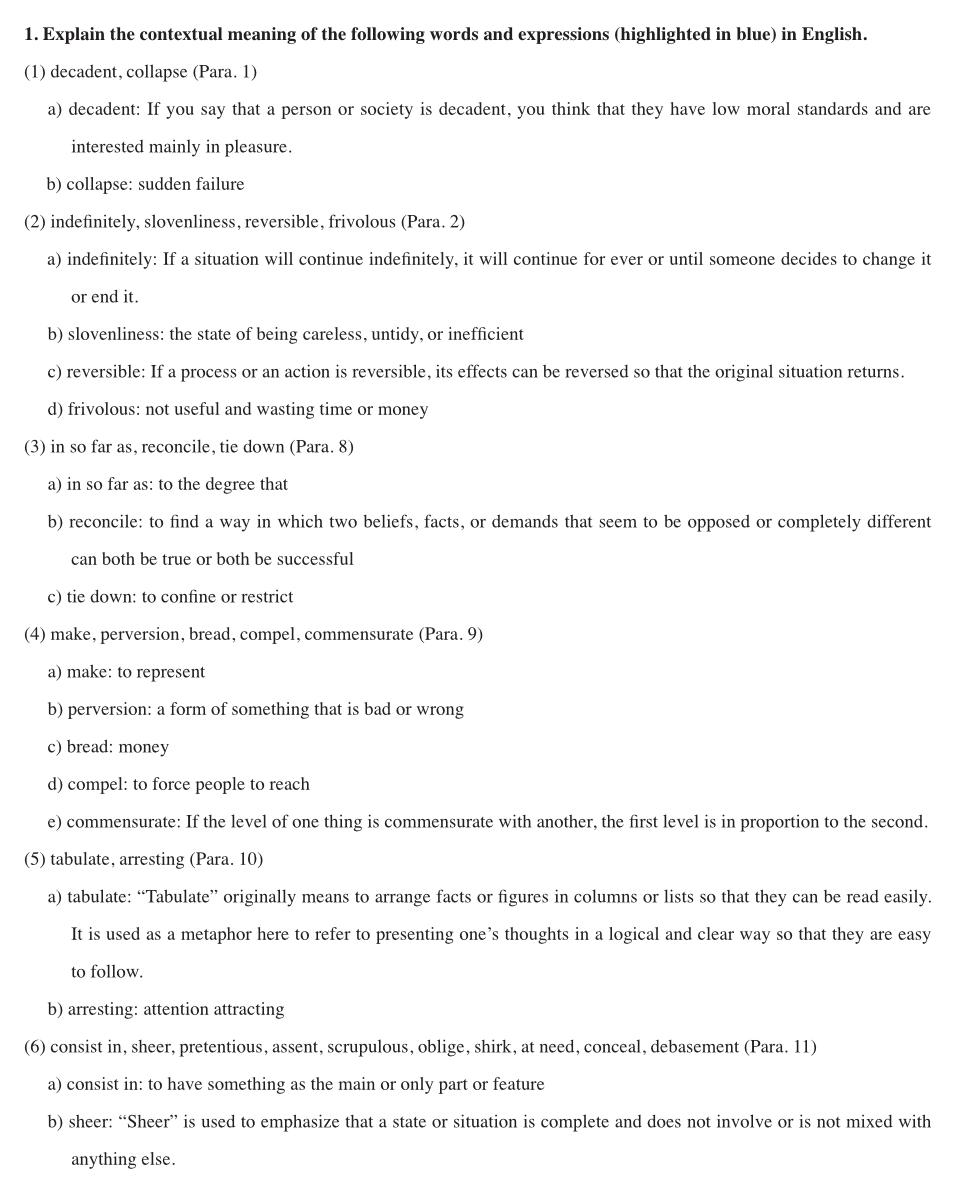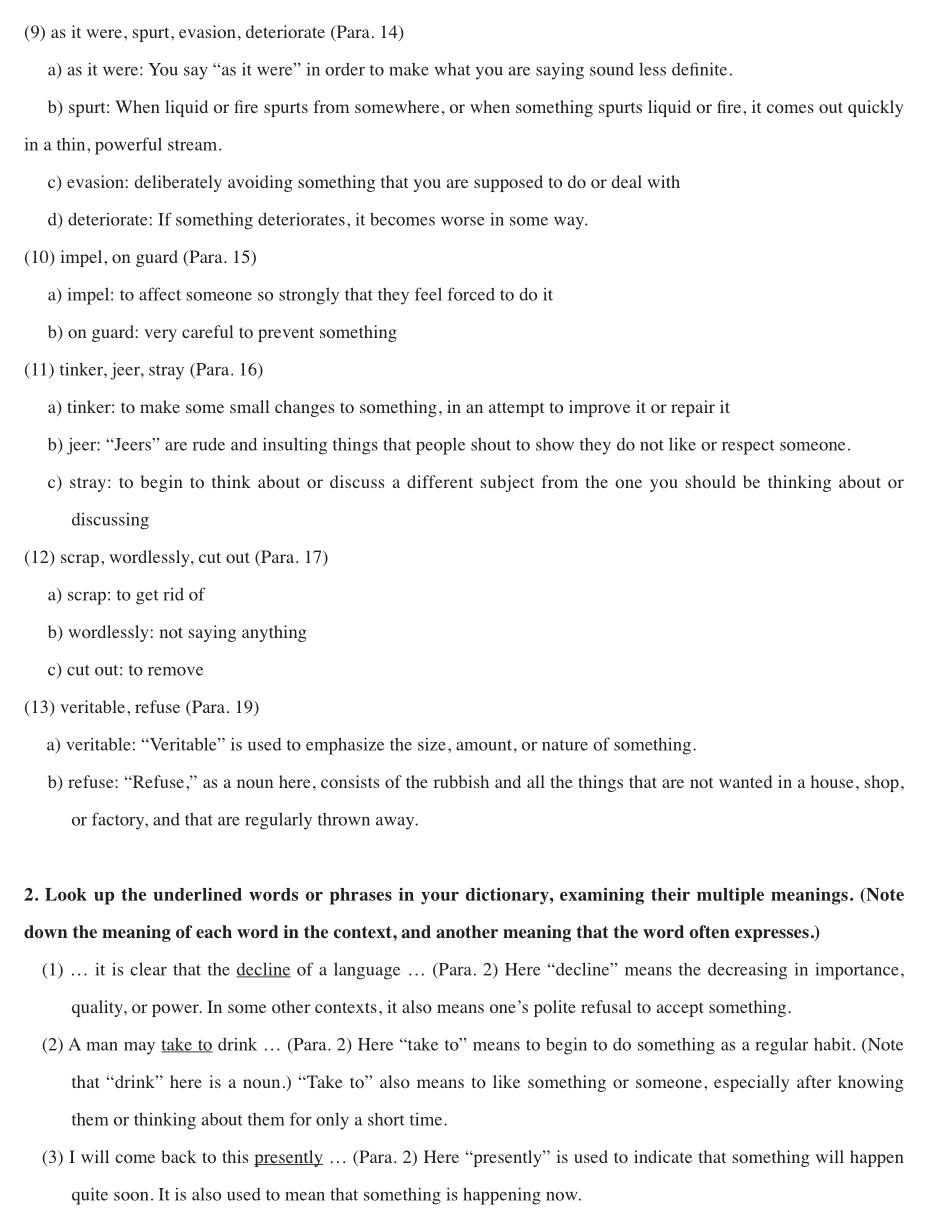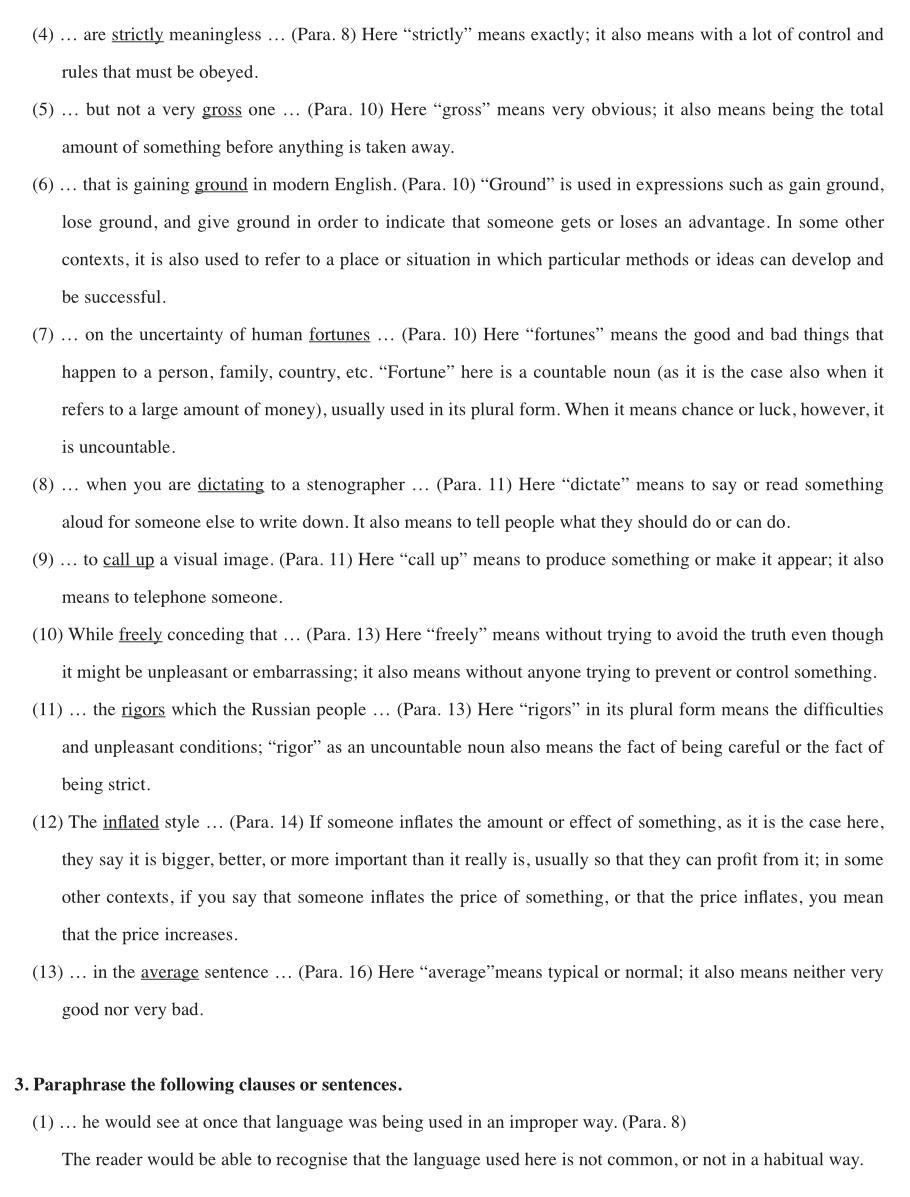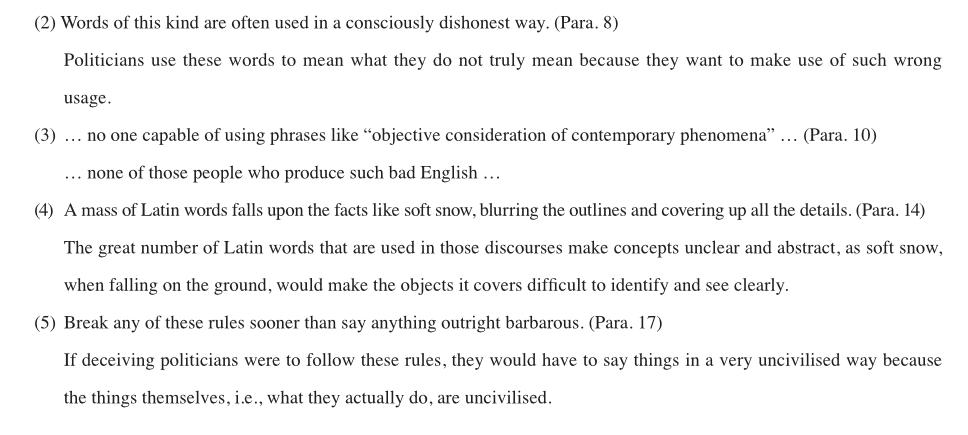Notes on the English Character
E.M.Forster



First note. I had better let the cat out of the bag at once and record my opinion that the character of the English is essentially middle class. There is a sound historical reason for this, for, since the end of the eighteenth century, the middle classes have been the dominant force in our community. They gained wealth by the Industrial Revolution, political power by the Reform Bill of 1832; they are connected with the rise and organization of the British Empire; they are responsible for the literature of the nineteenth century. Solidity, caution, integrity, efficiency. Lack of imagination, hypocrisy. These qualities characterise the middle classes in every country, but in England they are national characteristics also, because only in England have the middle classes been in power for one hundred and fifty years. Napoleon, in his rude way, called us “a nation of shopkeepers”. We prefer to call ourselves “a great commercial nation”—it sounds more dignified—but the two phrases amount to the same. Of course there are other classes: there is an aristocracy, there are the poor. But it is on the middle classes that the eye of the critic rests—just as it rests on the poor in Russia and on the aristocracy in Japan. Russia is symbolized by the peasant or by the factory worker; Japan by the samurai; the national figure of England is Mr. Bull with his top hat, his comfortable clothes, his substantial stomach, and his substantial balance at the bank. Saint George may caper on banners and in the speeches of politicians, but it is John Bull who delivers the goods. And even Saint George—if Gibbon is correct—wore a top hat once; he was an army contractor and supplied indifferent bacon. It all amounts to the same in the end.
Second Note. Just as the heart of England is the middle classes, so the heart of the middle classes is the public school system. This extraordinary institution is local. It does not even exist all over the British Isles. It is unknown in Ireland, almost unknown in Scotland (countries excluded from my survey), and though it may inspire other great institutions—Aligarh, for example, and some of the schools in the United States—it remains unique, because it was created by the Anglo-Saxon middle classes, and can flourish only where they flourish. How perfectly it expresses their character—far better for instance, than does the university, into which social and spiritual complexities have already entered. With its boarding-houses, its compulsory games, its system of prefects and fagging, its insistence on good form and on esprit de corps, it produces a type whose weight is out of all proportion to its numbers.
On leaving his school, the boy either sets to work at once—goes into the army or into business, or emigrates—or else proceeds to the university, and after three or four years there enters some other profession—becomes a barrister, doctor, civil servant, schoolmaster, or journalist. (If through some mishap he does not become a manual worker or an artist.) In all these careers his education, or the absence of it, influences him. Its memories influence him also. Many men look back on their school days as the happiest of their lives. They remember with regret that golden time when life, though hard, was not yet complex, when they all worked together and played together and thought together, so far as they thought at all; when they were taught that school is the world in miniature and believed that no one can love his country who does not love his school. And they prolong that time as best they can by joining their Old Boys society: indeed, some of them remain Old Boys and nothing else for the rest of their lives. They attribute all good to the school. They worship it. They quote the remark that “The battle of Waterloo was won on the playing fields of Eton.” It is nothing to them that the remark is inapplicable historically and was never made by the Duke of Wellington, and that the Duke of Wellington was an Irishman. They go on quoting it because it expresses their sentiments; they feel that if the Duke of Wellington didnt make it he ought to have, and if he wasnt an Englishman he ought to have been. And they go forth into a world that is not entirely composed of public-school men or even of AngloSaxons, but of men who are as various as the sands of the sea; into a world of whose richness and subtlety they have no conception. They go forth into it with well-developed bodies, fairly developed minds, and undeveloped hearts. And it is this undeveloped heart that is largely responsible for the difficulties of Englishmen abroad. An undeveloped heart—not a cold one. The difference is important, and on it my next note will be based.
For it is not that the Englishman cant feel—it is that he is afraid to feel. He has been taught at his public school that feeling is bad form. He must not express great joy or sorrow, or even open his mouth too wide when he talks—his pipe might fall out if he did. He must bottle up his emotions, or let them out only on a very special occasion.
Once upon a time (this is an anecdote) I went for a weeks holiday on the Continent with an Indian friend. We both enjoyed ourselves and were sorry when the week was over, but on parting our behaviour was absolutely different. He was plunged in despair.
He felt that because the holiday was over all happiness was over until the world ended. He could not express his sorrow too much. But in me the Englishman came out strong. I reflected that we should meet again in a month or two, and could write in the interval if we had anything to say; and under these circumstances I could not see what there was to make a fuss about. It wasnt as if we were parting forever or dying. “Buck up,” I said, “do buck up.” He refused to buck up, and I left him plunged in gloom.
The conclusion of the anecdote is even more instructive. For when we met the next month our conversation threw a good deal of light on the English character. I began by scolding my friend. I told him that he had been wrong to feel and display so much emotion upon so slight an occasion; that it was inappropriate. The word “inappropriate” roused him to fury. “What?”he cried. “Do you measure out your emotions as if they were potatoes?” I did not like the simile of the potatoes, but after a moments reflection I said:“Yes, I do; and whats more, I think I ought to. A small occasion demands a little emotion just as a large occasion demands a great one. I would like my emotions to be appropriate. This may be measuring them like potatoes, but it is better than slopping them about like water from a pail, which is what you did.” He did not like the simile of the pail. “If those are your opinions, they part us forever,” he cried, and left the room. Returning immediately, he added: “No—but your whole attitude toward emotion is wrong. Emotion has nothing to do with appropriateness. It matters only that it shall be sincere. I happened to feel deeply. I showed it. It doesnt matter whether I ought to have felt deeply or not.”
This remark impressed me very much. Yet I could not agree with it, and said that I valued emotion as much as he did, but used it differently; if I poured it out on small occasions I was afraid of having none left for the great ones, and of being bankrupt at the crises of life. Note the word“bankrupt”. I spoke as a member of a prudent middle-class nation, always anxious to meet my liabilities, but my friend spoke as an Oriental, and the Oriental has behind him a tradition, not of middle-class prudence but of kingly munificence and splendour. He feels his resources are endless, just as John Bull feels his are finite. As regards material resources, the Oriental is clearly unwise. Money isnt endless. If we spend or give away all the money we have, we havent any more, and must take the consequences, which are frequently unpleasant. But, as regards the resources of the spirit, he may be right. The emotions may be endless. The more we express them, the more we may have to express.
True love in this differs from gold and clay,
That to divide is not to take away. Says Shelley. Shelley, at all events, believes that the wealth of the spirit is endless; that we may express it copiously, passionately, and always; that we can never feel sorrow or joy too acutely.
In the above anecdote, I have figured as a typical Englishman. I will now descend from that dizzy and somewhat unfamiliar height, and return to my business of notetaking. A note on the slowness of the English character. The Englishman appears to be cold and unemotional because he is really slow. When an event happens, he may understand it quickly enough with his mind, but he takes quite a while to feel it. Once upon a time a coach, containing some Englishmen and some Frenchmen, was driving over the Alps. The horses ran away, and as they were dashing across a bridge the coach caught on the stonework, tottered, and nearly fell into the ravine below. The Frenchmen were frantic with terror: they screamed and gesticulated and flung themselves about, as Frenchmen would. The Englishmen sat quite calm. An hour later, the coach drew up at an inn to change horses, and by that time the situations were exactly reversed. The Frenchmen had forgotten all about the danger, and were chattering gaily; the Englishmen had just begun to feel it, and one had a nervous breakdown and was obliged to go to bed. We have here a clear physical difference between the two races—a difference that goes deep into character. The Frenchmen responded at once; the Englishmen responded in time. They were slow and they were also practical. Their instinct forbade them to throw themselves about in the coach, because it was more likely to tip over if they did. They had this extraordinary appreciation of fact that we shall notice again and again. When a disaster comes, the English instinct is to do what can be done first, and to postpone the feeling as long as possible. Hence they are splendid at emergencies. No doubt they are brave—no one will deny that—bravery is partly an affair of the nerves, and the English nervous system is well equipped for meeting physical emergency.
It acts promptly and feels slowly. Such a combination is fruitful, and anyone who possesses it has gone a long way toward being brave. And when the action is over, then the Englishman can feel.
There is one more consideration—a most important one. If the English nature is cold, how is it that it has produced a great literature and a literature that is particularly great in poetry? Judged by its prose, English literature would not stand in the first rank. It is its poetry that raises it to the level of Greek, Persian, or French. And yet the English are supposed to be so unpoetical. How is this? The nation that produced the Elizabethan drama and the Lake Poets cannot be a cold, unpoetical nation. We cant get fire out of ice. Since literature always rests upon national character, there must be in the English nature hidden springs of fire to produce the fire we see. The warm sympathy, the romance, the imagination, that we look for in Englishmen whom we meet, and too often vainly look for, must exist in the nation as a whole, or we could not have this outburst of national song. An undeveloped heart—not a cold one.
The trouble is that the English nature is not at all easy to understand. It has a great air of simplicity, it advertises itself as simple, but the more we consider it, the greater the problems we shall encounter. People talk of the mysterious East, but the West also is mysterious. It has depths that do not reveal themselves at the first gaze. We know what the sea looks like from a distance: it is of one color, and level, and obviously cannot contain such creatures as fish. But if we look into the sea over the edge of a boat, we see a dozen colors, and depth below depth, and fish swimming in them. That sea is the English character—apparently imperturbable and even. These depths and the colors are the English romanticism and the English sensitiveness—we do not expect to find such things, but they exist. And—to continue my metaphor—the fish are the English emotions, which are always trying to get up to the surface, but dont quite know how. For the most part we see them moving far below, distorted and obscure. Now and then they succeed and we exclaim, “Why, the Englishman has emotions! He actually can feel!” And occasionally we see that beautiful creature the flying fish, which rises out of the water altogether into the air and the sunlight. English literature is a flying fish. It is a sample of the life that goes on day after day beneath the surface; it is a proof that beauty and emotion exist in the salt, inhospitable sea.
And now lets get back to terra firma. The Englishmans attitude toward criticism will give us another starting point. He is not annoyed by criticism. He listens or not as the case may be smiles and passes on, saying,“Oh, the fellows jealous”; “Oh, Im used to Bernard Shaw; monkey tricks dont hurt me.” It never occurs to him that the fellow may be accurate as well as jealous, and that he might do well to take the criticism to heart and profit by it. It never strikes him—except as a form of words—that he is capable of improvement; his self-complacency is abysmal. Other nations, both Oriental and European, have an uneasy feeling that they are not quite perfect. In consequence they resent criticism. It hurts them; and their snappy answers often mask a determination to improve themselves. Not so the Englishman. He has no uneasy feeling. Let the critics bark. And the “tolerant humorous attitude” with which he confronts them is not really humorous, because it is bounded by the titter and the guffaw.
Turn over the pages of Punch. There is neither wit, laughter, nor satire in our national jester—only the snigger of a suburban householder who can understand nothing that does not resemble himself. Week after week, under Mr Punchs supervision, a man falls off his horse, or a colonel misses a golfball, or a little girl makes a mistake in her prayers. Week after week ladies show not too much of their legs, foreigners are deprecated, originality condemned. Week after week a bricklayer does not do as much work as he ought and a futurist does more than he need. It is all supposed to be so good-tempered and clean; it is also supposed to be funny. It is actually an outstanding example of our attitude toward criticism: the middle-class Englishman, with a smile on his clean-shaven lips, is engaged in admiring himself and ignoring the rest of mankind. If, in those colorless pages, he came across anything that really was funny—a drawing by Max Beerbohm, for instance—his smile would disappear, and he would say to himself, “The fellows a bit of a crank,” and pass on.
This particular attitude reveals such insensitiveness as to suggest a more serious charge: is the Englishman altogether indifferent to the things of the spirit? Let us glance for a moment at his religion—not, indeed, at his theology, which would not merit inspection, but at the action on his daily life of his belief in the unseen. Here again his attitude is practical. But an innate decency comes out: he is thinking of others rather than of himself. Right conduct is his aim. He asks of his religion that it shall make him a better man in daily life: that he shall be more kind, more just, more merciful, more desirous to fight what is evil and to protect what is good. No one could call this a low conception. It is, as far as it goes, a spiritual one. Yet—and this seems to be typical of the race—it is only half the religious idea. Religion is more than an ethical code with a divine sanction. It is also a means through which man may get into direct connection with the divine, and, judging by history, few Englishmen have succeeded in doing this. We have produced no series of prophets, as has Judaism or Islam. We have not even produced a Joan of Arc, or a Savonarola. We have produced few saints. In Germany the Reformation was due to the passionate conviction of Luther. In England it was due to palace intrigue. We can show a steady level of piety, a fixed determination to live decently according to our lights—little more.
Well, it is something. It clears us of the charge of being an unspiritual nation. That facile contrast between the spiritual East and the materialistic West can be pushed too far. The West also is spiritual. Only it expresses its belief, not in fasting and visions, not in prophetic rapture, but in the daily round, the common task. An incomplete expression, if you like. I agree. But the argument underlying these scattered notes is that the Englishman is an incomplete person. Not a cold or an unspiritual one. But undeveloped, incomplete.
I have suggested earlier that the English are sometimes hypocrites, and it is not my duty to develop this rather painful subject. Hypocrisy is the prime charge that is always brought against us. The Germans are called brutal, the Spanish cruel, the Americans superficial, and so on; but we are perfide Albion, the island of hypocrites, the people who have built up an Empire with a Bible in one hand, a pistol in the other and financial concessions in both pockets. Is the charge true? I think it is; but what we mean by hypocrisy? Do we mean conscious deceit? Well, the English are comparatively guiltless of this; they have little of the Renaissance villain about them. Do we mean unconscious deceit? Muddle-headedness? Of this I believe them to be guilty. When an Englishman has been led into a course of wrong action, he has nearly always begun by muddling himself. A publicschool education does not make for mental clearness, and he possesses to a very high degree the power of confusing his own mind. How does it work in the domain of conduct?
Jane Austen may seem an odd authority to cite, but Jane Austen has, within her limits, a marvelous insight into the English mind. Her range is limited, her characters never attempt any of the more scarlet sins. But she has a merciless eye for questions of conduct, and the classical example of two English people muddling themselves before they embark upon a wrong course of action is to be found in the opening chapters of Sense and Sensibility. Old Mr. Dashwood has just died. He has been twice married. By his first marriage he has a son, John; by his second marriage three daughters. The son is well off; the young ladies and their mother—for Mr. Dashwoods second wife survives him—are badly off. He has called his son to his deathbed and has solemnly adjured him to provide for the second family. Much moved, the young man promises, and mentally decides to give each of his sisters a thousand pounds: and then the comedy begins. For he announces his generous intention to his wife, and Mrs. John Dashwood by no means approves of depriving their own little boy of so large a sum. The thousand pounds are accordingly reduced to five hundred. But even this seems rather much. Might not an annuity to the stepmother be less of a wrench? Yes—but though less of a wrench it might be more of a drain, for “she is very stout and healthy, and scarcely forty.” An occasional present of fifty pounds will be better, “and will, I think, be amply discharging my promise to my father.”Or, better still, an occasional present of fish. And in the end nothing is done, nothing; the four impecunious ladies are not even helped in the moving of their furniture.
Well, are the John Dashwoods hypocrites? It depends upon our definition of hypocrisy. The young man could not see his evil impulses as they gathered force and gained on him. And even his wife, though a worse character, is also self-deceived. She reflects that old Mr. Dashwood may have been out of his mind at his death. She thinks of her own little boy—and surely a mother ought to think of her own child. She has muddled herself so completely that in one sentence she can refuse the ladies the income that would enable them to keep a carriage and in the next can say that they will not be keeping a carriage and so will have no expenses. No doubt men and women in other lands can muddle themselves, too, yet the state of mind of Mr. and Mrs. John Dashwood seems to me typical of England. They are slow—they take time even to do wrong; whereas people in other lands do wrong quickly.
I hope and believe myself that in the next twenty years we shall see a great change, and that the national character will alter into something that is less unique but more lovable. The supremacy of the middle classes is probably ending. What new element the working classes will introduce one cannot say, but at all events they will not have been educated at public schools. And whether these notes praise or blame the English character—that is only incidental. They are the notes of a student who is trying to get at the truth and would value the assistance of others. I believe myself that the truth is great and that it shall prevail. I have no faith in official caution and reticence. The cats are all out of their bags, and diplomacy cannot recall them. The nations must understand one another and quickly; and without the interposition of their governments, for the shrinkage of the globe is throwing them into one anothers arms. To that understanding these notes are a feeble contribution—notes on the English character as it has struck a novelist.
學習任務

二期答案

二期答案

二期答案

二期答案

二期答案

篇章講解賞析
作為英語學習者,我們至少可以從兩個角度學習、欣賞這篇文章。首先,這是一篇極好的英語寫作指南。極為重要的一點就是,寫作的核心是思想和觀點,語言和形式是次要的。寫作的首要任務是要“想”清楚,要明確內容,使之具體化,而不應讓某個慣常的語匯或表達在不經意間潛入腦中,最終自己都搞不清這到底是不是自己原初的想法和認識。我們生活在話語的世界中,難免接觸各類話語并受到影響。例如,我們經常使用網絡用語來表達情緒,而很多網絡用語在語義上是很模糊的,內涵不清晰,外延缺邊界。即使是用以表達情緒,網絡語言也很不準確。總是模模糊糊地說話,長此以往,我們的情緒甚至都變得不那么精致了。因此,監控流行話語對思維的潛在影響,是優秀寫作者應當具備的基本語言意識。
其次,作者深刻地揭露了西方政客的虛偽、狡猾和空虛。在第17段,作者非常諷刺又精辟地說到了“Break any of these rules sooner than say anything outright barbarous.”在作者看來,如果這些西方政客遵從了他所提出的關于語言使用的建議,那么他們就只能直接說臟話了——所言即所行,既然所行均為骯臟的勾當,那么忠誠地反映了所行的所言,也就只好用臟話表達了。作者看似只是在探討語言和思維的關系以及改善語言表達的建議,實質上尖銳地批評了當時的一些社會現實。這本身也是作者思維的犀利在其語言表達上的充分體現,值得贊賞。(北京外國語大學 徐浩)

